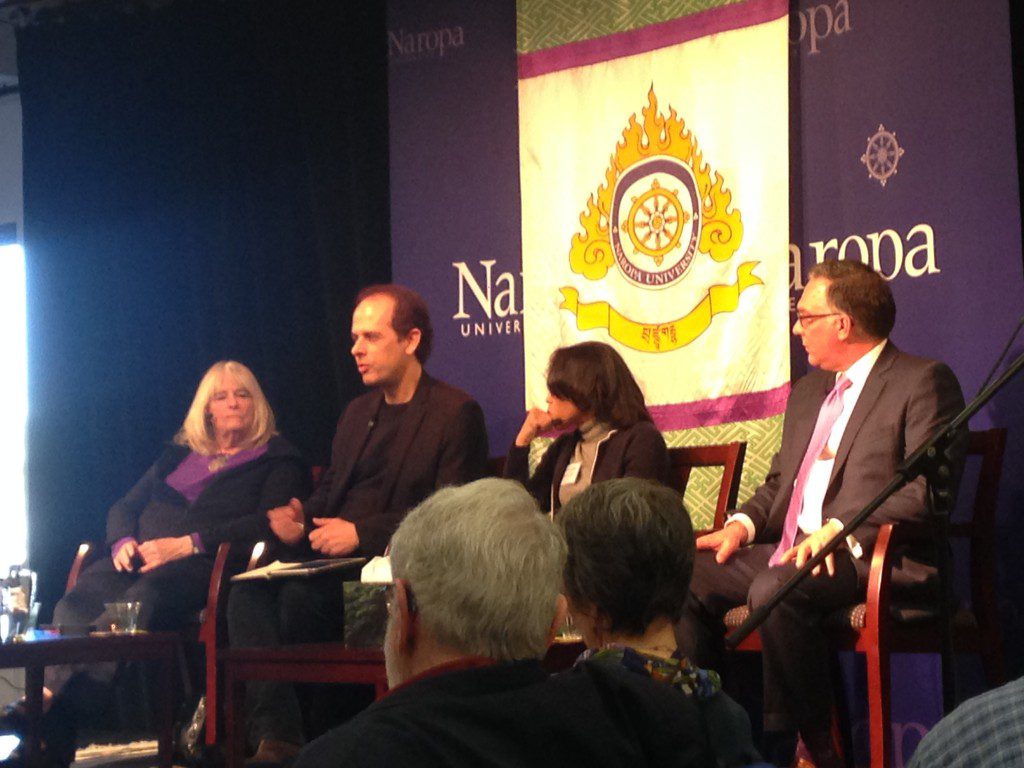
Today was our first full day (of only two full days) at the Mindfulness, MOOCs, and Money conference held in Boulder, CO at Naropa University. And, as one should expect after 10 hours of workshops, conversations, and lectures, I am far from being done in terms of digesting the day. That said, some notes:
The day began with an “Opening Gathering” where we explored some of the backgrounds and identities that we are bringing to the conference. In general, we were white, cis, and middle-class. There was more diversity than I’m used to in Montana (which doesn’t say much) but, as Rhonda Magee noted, the diversity is in fact severely lacking and represents what she knows of academia in general. Thus, even at a conference at a progressive institution organized around progressive themes, the power structures of the prevalent society are what we see represented.
In the Opening Gathering we were asked what we see dying in Higher Education, and what we see being born. Under dying we heard a variety of responses:
- Liberal arts, critical thinking
- Tenure track jobs / full time faculty
- Cultural identity
- Walls/boxes (limitations)
- Methodology
- Traditional teaching environments limited by time and place
- The Western canon (But not fast enough)
And – What is being born?
- New knowledge
- Transmission / relationship
- Models of student engagement
- Unknown career paths
- Utilitarian education
This is from memory, and we didn’t discuss what exactly was meant by each suggestion. But apparent to me at least was a mix of worries about what is being lost and joy for what might be born in its place.
After this, in the keynote presentation, John Pryor offered a lesson in why students go to college today: to get a better job. However, he says, a fair number of recent graduates today don’t get that job. And he notes, that when he asked faculty about their priorities in teaching, preparing students for a job was only #7 on that list (teaching critical thinking skills was #1). As you’ll see in the talk, students want jobs, parents want jobs, society wants kids to get jobs, but those pesky faculty just want to teach critical thinking and tolerance and creativity.
As a personal aside, I came from what I take to have been a wonderful degree in philosophy and graduate studies in theology, religion, and history. While “getting a job” has come up at times, I don’t think my education was ever particularly driven toward that goal, and I’m deeply thankful for that. My teachers/mentors/supervisors have taught me to be a creative and critical thinker, something that has changed my life irrevocably for the better and hopefully made me a more engaged national and global citizen. But it is true that I don’t have the engaging job at Bank of America that my parents and I and society really think I should have.
An aside from the aside: it’s also true that my academic disciplines have been terrible in terms of critical investigation of themselves and their Eurocentrism, sexism, racism, and so on.
In any case, I wasn’t sure what more to get from that talk. There were a number of great statistical breakdowns showing just how and where students are miserable. Some of it was pretty depressing, such as 37% of students reporting that not a single professor in their entire undergraduate studies “made them excited about learning.” That simply astounded me. I can’t count how many professors made me excited about learning in my undergraduate years at U-Montana. Notably, none of them were my Business School professors (I majored in Business for 2 years); though not all of them were in Philosophy (at least 3 were in philosophy, one was my Buddhist studies professor, one a “meditation teacher” adjunct/grad fellow, one was an Anthropology profess, one a Sociology professor, one an Astronomy professor). It was interesting to hear that Ivy League Schools didn’t do any better in general than State Schools in ensuring student “thriving” after graduation.
Moving on, we had a number of wonderful-though-brief breakout sessions (see link/schedule above) and then a panel discussion (pictured above). There John Pryor reiterated much of what he mentioned in his keynote, stating that he doesn’t like to think of this as a “crisis” but rather just a “transition” like so many others that we have been through. It just looks bad now because there is so much debt involved.
David Germano spoke next, insisting that there is a crisis in higher ed today, and that we must look at a number of the factors contributing to that:
- The hidden suffering of our students
- Our lack of concern about students whole lives/futures
- The increasing fragmentation of knowledge – fields and disciplines are increasingly separated
- The need for “an ontology of care” at the heart of our curricula
- Hidden knowledge – so much is produced that nobody ever reads or cares about, and,
- The need for deep contextual understanding of contemplative traditions
Lastly, Rhonda Magee spoke very personally and deeply about the reality of crisis in higher education today and, in fact, the reality of crisis for minorities in higher education historically. It was her talk that most moved me, and, I think, the entire audience, because it came from not only great intelligence but deep experiential wisdom and an urgency that we all recognize and confront crisis and oppression in our day to day lives. As she stated, people of color have historically been told to “adapt, adjust, assimilate, and overcome” the systems of oppression inherent in culturally white institutions such as Higher Ed. In the end she asked us if we could focus, at least in part, on this as an important aspect of higher ed in crisis and how could we show that this matters?
I’m out of time for tonight unfortunately. I’d love to say more about all of these and to address David Korten’s Keynote on “Higher Ed and the Human Future” – but that’ll have to come in a later post. In breif, he suggested an entire overhaul (if not overthrow) of the Higher Ed system along with our thought about economics and politics. As always, comments are welcome.












